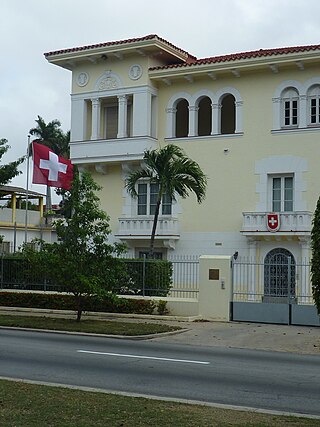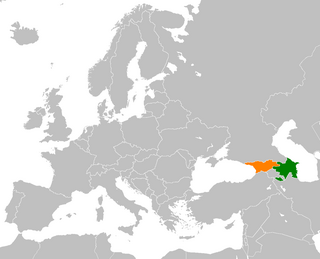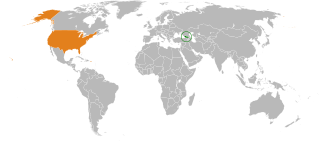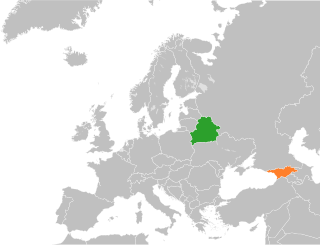
A diplomatic mission or foreign mission is a group of people from a state or organization present in another state to represent the sending state or organization officially in the receiving or host state. In practice, the phrase usually denotes an embassy or high commission, which is the main office of a country's diplomatic representatives to another country; it is usually, but not necessarily, based in the receiving state's capital city. Consulates, on the other hand, are smaller diplomatic missions that are normally located in major cities of the receiving state. As well as being a diplomatic mission to the country in which it is situated, an embassy may also be a nonresident permanent mission to one or more other countries.

Georgia's location, nestled between the Black Sea, Russia, and Turkey, renders it strategically important. It is developing as the gateway from the Black Sea to the Caucasus and the larger Caspian region, but also serves as a buffer between Russia and Turkey. Georgia has a long and tumultuous relationship with Russia, but it is reaching out to its other neighbours and looking to the West in search of alternatives and opportunities. It signed a partnership and cooperation agreement with the European Union, participates in the Partnership for Peace, and encourages foreign investment. France, Germany, South Korea, the United Kingdom, and the United States all have embassies in Tbilisi. Georgia in 2004-2008 sought to become a member of NATO, but did not succeed in the face of strong Russian opposition.

The foreign relations of the Russian Federation is the policy arm of the government of Russia which guides its interactions with other nations, their citizens, and foreign organizations. This article covers the foreign policy of the Russian Federation since the dissolution of the Soviet Union in late 1991. At present, Russia has no diplomatic relations with Ukraine due to its ongoing invasion of Ukraine. Other than Ukraine, Russia also has no diplomatic relations with Georgia, Bhutan, Federated States of Micronesia or Solomon Islands.

A protecting power is a country that represents another sovereign state in a country where said sovereign state lacks its own formal diplomatic representation in the protecting power’s state. It is common for protecting powers to be appointed when two countries break off diplomatic relations with each other. The protecting power is responsible for looking after the protected power's diplomatic property and citizens in the hosting state. If diplomatic relations were broken by the outbreak of war, the protecting power will also inquire into the welfare of prisoners of war and look after the interests of civilians in enemy-occupied territory.

Foreign relations exist between Azerbaijan and Georgia, two neighboring small nations which were former Republics of the Soviet Union. Azerbaijan has an embassy in Tbilisi and Georgia has an embassy in Baku. Both countries are full members of the Council of Europe, the Organization for Security and Co-operation in Europe (OSCE) and the Organization of the Black Sea Economic Cooperation (BSEC). The two countries are among the four founding members of the GUAM Organization for Democracy and Economic Development along with Ukraine and Moldova.

Relations between the countries of Georgia and the United States continue to be very close and encompass multiple areas of bilateral cooperation. One of the key U.S. allies in Eastern Europe, Georgia was the third largest troop contributor in the Iraq War and the largest per-capita contributor to the U.S. led mission in Afghanistan. The United States for its part is actively assisting Georgia in strengthening its state institutions in face of increasing pressure from its northern neighbor Russia and has provided the country with financial assistance in excess of three billion dollars since 1991. Since 2009, Georgian–American relations are streamlined by the U.S.–Georgia Charter on Strategic Partnership, which created four bilateral working groups on priority areas of democracy; defense and security; economic, trade, energy issues, people-to-people and cultural exchanges.

The Embassy of the Republic of Georgia in Moscow was the diplomatic mission of Georgia in the Russian Federation. It was located at 6 Maly Rzhevsky Lane in the Arbat district of Moscow. On 29 August 2008, Georgia broke diplomatic relations with Russia and withdrew all its diplomats from Russia and closed the Georgian Embassy in Moscow. They also ordered Russia to withdraw all its diplomats from Georgia and close the Russian Embassy in Tbilisi. Russia and Georgia had previously fought a five-day war over two Georgian breakaway regions declaring independence, South Ossetia and Abkhazia. Georgia is represented through the Georgian Interests Section of the Embassy of Switzerland in Russia located in the same building.

The Embassy of the Kingdom of Norway in Moscow is the chief diplomatic mission of Norway in the Russian Federation. It is located at 7 Povarskaya Street in the Arbat district of Moscow.

Vyacheslav Yevgenevich Kovalenko is a career diplomat and a former Ambassador Extraordinary and Plenipotentiary of the Russian Federation to Armenia. He served as ambassador to Georgia until the breakdown of diplomatic relations between Georgia and Russia in the wake of the August 2008 war.

French-Georgian relations are foreign relations between France and Georgia. Formal diplomatic relations between the two countries were first established in January 1921 but were soon interrupted by the Red Army invasion of Georgia. Relations were restored on August 21, 1992 following the collapse of the Soviet Union. Both nations are members of the Council of Europe. France is a member of the European Union, which Georgia applied for in 2022.

Georgia–Italy relations are foreign relations between Georgia and Italy. Both countries established diplomatic relations on 11 May 1992. Georgia has an embassy in Rome. Italy has an embassy in Tbilisi. Both countries are full members of the Council of Europe.

Georgia–Israel relations are diplomatic, commercial and cultural ties between Georgia and Israel. Diplomatic relations were formally established on June 1, 1992, alongside establishing diplomatic relations with the US. Georgia has an embassy in Tel Aviv and a consulate in Jerusalem. Israel has an embassy in Tbilisi.

Before 1918, both Belarus and Georgia were part of the Russian Empire and both were part of the USSR until 1991. Both countries established diplomatic relations in 1992.

Formal diplomatic relations between Georgia and the United Kingdom can be traced back to at least 1919, during the First Georgian Republic. After the defeat of German Empire, Georgia's ally, in WWI, parts of Georgia came under British administration and British troops were also stationed in Tiflis to stave off the Bolshevik invasion. This lasted until 1920, when Britain left due to a variety of geopolitical factors.
A de facto embassy is an office or organisation that serves de facto as an embassy in the absence of normal or official diplomatic relations among countries, usually to represent nations which lack full diplomatic recognition, regions or dependencies of countries, or territories over which sovereignty is disputed. In some cases, diplomatic immunity and extraterritoriality may be granted.

The Embassy of the United States of America in Tehran was the American diplomatic mission in the Imperial State of Iran. Direct bilateral diplomatic relations between the two governments were severed following the Iranian Revolution in 1979, and the subsequent seizure of the embassy in November 1979.

The Embassy of the Kingdom of Denmark in Kyiv is the diplomatic mission of Denmark in Ukraine.

Georgia—Iraq relations refers to the bilateral relations of the Republic of Georgia and the Republic of Iraq. Georgia does not have an embassy in Baghdad, but Iraq does have an embassy in Tbilisi, the Georgian capitol.


















